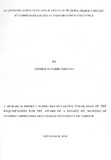| dc.description.abstract | Financing decisions of most firms consists of determining the ratio of debt to equity depending on their financing needs. Booth et al (2001) found out that factors affecting capital structure decisions in developed and developing countries are the same. This study seeks to fill the existing research gap by investigating the application of pecking order theory to companies listed at NSE. The objective of the study was to investigate the application of pecking order concept by companies listed at Nairobi Stock Exchange.
Exploratory research design was chosen for this study as it enabled the researcher to generalise the findings to a larger population.The population of this study was all the companies listed at NSE, there are 55 companies that are currently listed in the NSE this study was restricted to those that have no regulated capital and those that have not been suspended from the NSE. The secondary data was collected from the financial statements of the company and books. The study established that capital structure decision of the company influenced their asset structure and size of their company since large firms are highly leveraged, large firms uses more of debts, small firms are more leveraged than large firms hence preferring to borrow short-term rather than long-term debt because of fixed costs associated with this alternative.
Capital structure decision influence retained earnings, size, growth, company turnover, assets structure and reserves of the company to a great extent. According to the results obtained, the firms listed at NSE give priority to internal resources for finance as their total asset profitability, liquidity levels and sales amounts increase and prefer a lower level of external resource use. This condition supports the explanations made on the basis of pecking order theory.
The study concludes that limited internal fund and availability of internal funds influences the application of pecking order concepts to companies listed at NSE. The study further revealed that those companies with more internal funds utilize these internal funds to fund their new projects rather than using debt or even equity ,while those companies with limited internal funds opt to get debt to fund their projects and if debt is not readily available the opt for equity thus following the pecking order theory. | en_US |

